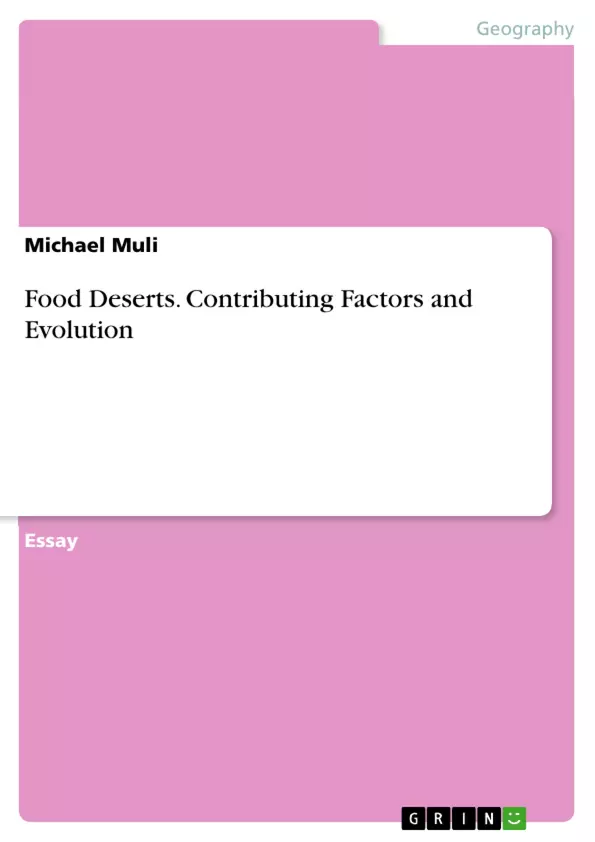The provision of food is a going concern activity that has to remain and made a conditioned reflex action. Agriculture plays a crucial role in ensuring that citizens of a particular state have enough food that can sustain their lives.
Starvation is a nutritional disorder that is mostly likely to occur if there are scarce food commodities edible goods. The supply of food and especially in the big towns is a significant challenge that many nations suffer and especially the developed states such as the United States of America. The result of inadequate food supply and especially in the urban centers contributes to food desertification.
Inhaltsverzeichnis (Table of Contents)
- Introduction
- Factors contributing to food deserts
- Evolution of inflation and cultural diversity
- Conclusion
Zielsetzung und Themenschwerpunkte (Objectives and Key Themes)
This text aims to explore the phenomenon of food deserts in urban centers, particularly in the United States. It seeks to identify and analyze the factors contributing to this situation, ultimately highlighting the significant impact of food deserts on the health and well-being of residents.
- Economic factors, such as inflation and its impact on agricultural production
- Political and social factors, including government policies and societal shifts in agricultural participation
- The role of technology and its influence on agricultural practices and income opportunities
- The consequences of food deserts for urban residents, such as health disparities and nutritional challenges
Zusammenfassung der Kapitel (Chapter Summaries)
The introduction provides an overview of the concept of food deserts and their significance, particularly within the context of the United States. It highlights the challenges of food supply in urban areas, emphasizing the detrimental effects of food deserts on residents.
The chapter "Factors contributing to food deserts" delves into the key drivers behind the emergence of food deserts. It examines the economic impact of inflation on agricultural production and the role of government policies in shaping the agricultural landscape. The chapter also explores the societal shifts in agricultural participation, influenced by factors such as technological advancements and changing cultural perceptions.
The section "Evolution of inflation and cultural diversity" investigates the interconnectedness of inflation and cultural change in contributing to the development of food deserts. It analyzes the impact of inflation on the affordability of food and how societal transformations have impacted agricultural practices and the overall food system.
Schlüsselwörter (Keywords)
Food deserts, urban centers, inflation, agricultural production, government policies, societal shifts, technological advancements, health disparities, nutritional challenges, economic factors, social factors, cultural diversity, economic growth.
Frequently Asked Questions
What is a food desert?
A food desert is an urban area where it is difficult to buy affordable or good-quality fresh food. This often occurs in big towns in developed states like the USA due to inadequate food supply chains.
How does inflation contribute to food deserts?
Inflation impacts the affordability of food and the costs of agricultural production. High prices can lead to a decrease in the availability of healthy food options in low-income urban centers.
What role does the government play in food desertification?
Government policies regarding agriculture and urban planning significantly shape the food landscape. Policies that fail to support local urban agriculture can contribute to the emergence of food deserts.
How does technology influence agricultural participation?
Technology changes agricultural practices and income opportunities. While it can improve efficiency, it can also lead to societal shifts where fewer people participate in traditional farming, affecting local food supplies.
What are the health consequences of living in a food desert?
Residents in food deserts often face nutritional challenges and health disparities, such as higher rates of obesity or malnutrition, due to the lack of access to fresh and healthy food commodities.
- Arbeit zitieren
- B.com Michael Muli (Autor:in), 2015, Food Deserts. Contributing Factors and Evolution, München, GRIN Verlag, https://www.grin.com/document/311685



